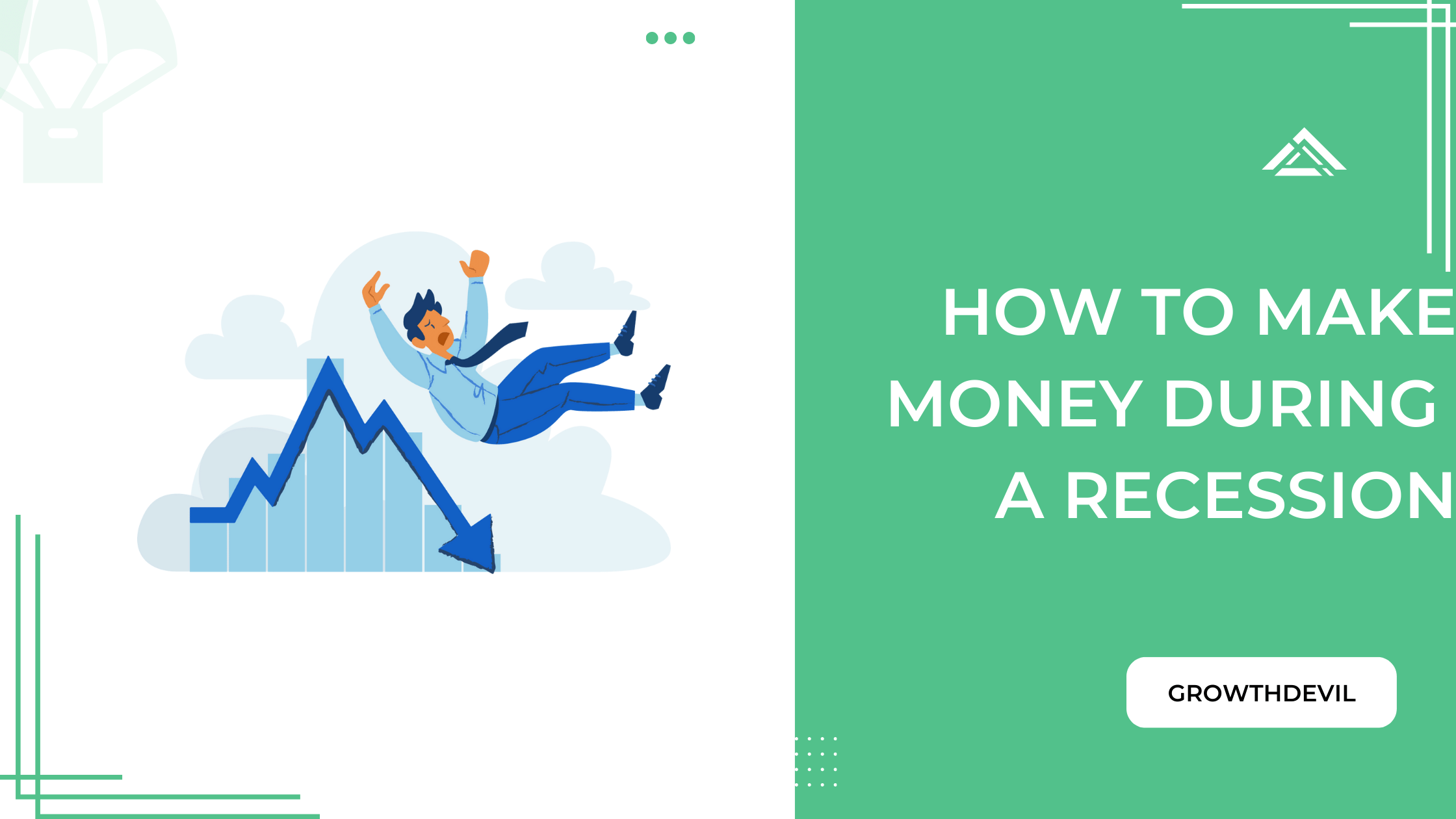Are you looking for ways to make money during a recession? Don’t look further, you have just landed in the right place.
The economy is the most integral part of a nation. Ups and downs usually happen that can affect the economy and earnings of a citizen. Recession is one of those unfortunate events that can affect a country’s economy and regular person’s earnings as well.
Recession is an unavoidable situation, but you can use this unfortunate period to make money in your favor. If you invest your money in the right place, you will definitely benefit from skyrocketed ROI (Return on Investment).
In this post, I will list a few ways you make money during a recession. I have also added a few things that you should refrain from doing during a recession so you don’t lose your hard-earned money.
Let’s get started.
What Exactly Is A Recession?
Generally, a recession is a period of a temporary decline in economic activity. During this period, industrial and trade activities are reduced. Recessions are usually identified by a collapse in a country’s GDP in two successive quarters.
Recessions can raise the unemployment rate on a high note. Job cuts and layoffs are typical courses of action during a recession. However, you can still make money by turning the whole situation in your favor. This is what exactly I am going to tell you in the next section.
How To Make Money During A Recession?
Here are some proven methods you can try to make money during a recession.
1. Investing in Fallen Stocks
During a recession, the stock market is also gets affected very badly. Almost all stocks fall due to businesses experiencing decreased demand for their services and products. However, it might be a short-term collapse. But you can use this collapse to your advantage.

As the value of the profitable stock goes down during a recession, you can purchase a significant amount of shares and keep them till the market rises. Once you see the rising value of your stocks, you can sell them at a great profit or keep them for the future.
2. Invest in Consumer Staples
Consumer staples are daily essentials such as food, beverages, household, personal care products, drugs, and medical supplies. Even during a recession or other economic crisis, consumer staples are the last things to cut from a family budget. Other companies might experience a drop in revenue, but companies selling daily needs hardly see any drop. This is why stocks related to consumer staples companies are known as defensive stocks.
According to the stats, consumer staples companies outperformed S&P 500 multiple times during recessionary periods. So investing in renowned consumer staples companies would be a smart decision as their shares tend to remain flexible even during an economic falter.
3. Buy Into Dividends
Dividends serve a huge purpose during an economic crisis. You can hold your stocks owned by large-cap companies or established ones with strong cash flow and balance sheets. These companies have better chances of survival in these downturns. They also pay dividends.
If your company has a history of increasing or paying dividends, you can ensure yourself economically safe from recessions. And dividend stock tends to outperform non-dividends during a fallen market. So you can own dividends through ETFs (Exchange Traded Funds) or Mutual Funds. At least you will recover your investment money into dividends during a recession.
4. Protect Your Earning Sources
There are possibilities of you losing your source of income during a recession. As a result, you might start spending your savings on searching for a new job that can affect your family budget. Pay your high-interest credit card bills first and see if a 0% balance transfer is available.
It will help if you cut down on your additional expenses until you find a stable income source. Negotiate creativity when it comes to large expenses. If you are running a business, you need to ensure your company’s future growth by taking the necessary decisions.
5. Sell Unused Stuff
If there are some functional items around you, but they are no longer useful, you can sell them to earn money during a recession. If something is unused for you, it doesn’t mean it won’t be useful for others. You can sell those items at a reasonable price.

You can sell used items such as books, CDs/DVDs, mobiles, video games (consoles), laptops, watches, etc. Websites like Amazon, eBay, and Etsy allow you to list used items if they are in good and working condition.
6. Purchase Quality Assets
Usually, blue chip stocks and sectoral funds are pretty expensive on regular days. However, during a recession, when the entire economy experiences a huge downturn, these stocks become available at a discounted rate.
You can use this opportunity to purchase those quality assets at a cheap rate. It will help you diversify your portfolio by including automobile, technological, banking, and other sectors.
7. Invest In Real Estate
During recessions, you can find high-quality properties at a throwaway range. It happens due to a fall in demand for real estate. So it can be high time for you to invest in housing properties. If you have planned to buy a house in the future, it will be your opportunity. You can also invest in real estate for a return on investment.
8. Generate Passive Income
The financial crisis hits hard on a common person during a recession as the unemployment rate rises. You are lucky enough to have a job during these situations. Everybody must have a passive income source, even if they have a nine-to-five job. So you will be prepared for any economic crisis in the future.
You can generate passive income in many ways. The best part about passive income sources is that you don’t have to work too much or go outside to earn money necessarily. You can just sit back with your laptop and earn money online. You can do a dropshipping or print-on-demand business or create a course to sell to publish online to earn royalties.
9. Minimize High-interest Card Debts
During a recession, high-interest credit cards can hurt your budget very badly. If you have taken too much debt during or before the recession, you will have to pay the bills at the same high-interest rates.
In such cases, you can negotiate with your card issuer to lower your interest rates. Before contacting the issuer, you can think of the terms that will make a strong case for your request. You can say that you have a good history of paying debts early or on time. There’s no risk in talking to your card issuer about such things.
If your issuer doesn’t provide a solution to your issue, you can transfer your debts to a different credit card with lower interest rates. You can also pay your debts in the early recession and consider taking fewer debts during this tragic time.
Things To Avoid During A Recession
Now that you know where you can invest your money to generate money during a recession, it is time to know what you should avoid in this duration. If you are not cautious enough, you or your company could go bankrupt. Here are a few things you should avoid doing during a recession.
- Don’t Sell Falling Stocks: Recessions can make stocks fall very badly. It creates a panic situation that makes investors sell their stocks at a great loss. Don’t be tempted to sell your stocks at a loss in order to recover your investment. Patience is the key to stock investment. If you give some time to the stock market to recover, your profit will get on track.
- Cosigning a Loan: Cosigning a loan can be a disastrous commitment during a recession. If the borrower fails to make payments on time, the cosigner has to pay those bills. You might lose all your savings during this economic downturn. Instead of cosigning a loan, you can assist the borrower with a down payment.
- Getting an ARM: Some people choose an ARM (Adjustable-rate Mortgage) while purchasing a home. This option makes sense on common days as interest rates and monthly payments stay low. But during a recession, adjustable rates are more likely to rise, which can hurt your financial stability.
- Taking a New Debt: Taking loans and debts such as student loans, home equity loans, or car loans won’t be a problem on common days as you will be able to generate enough money to pay monthly bills on time. But during downturns like recession, taking such loans can be a risky move as you might have to work overtime or do multiple jobs to pay your bills.
If you’re running a business, you can also postpone your expenditure for capital improvements or take new loans during a recession, as it can create financial risks for a long time. You can wait until the recession is completely over and economic recovery begins.
Related Read:
Conclusion: How To Make Money During A Recession
Recessions are not meant for a long time. However, it is inevitable that it can affect everyone’s life by any means. But one thing is sure these types of economic crises are always followed by a recovery. When you are aware, you can take advantage of such states by investing in the right place.
You need to stay positive and calm in such downturn situations. Don’t panic and make quick decisions that you regret later. Invest in profitable stocks like consumer staples or discounted stocks and wait till the recession is over. And then, you will definitely make a profit out of nowhere.
- 12 Best Dropshipping Stores For Sale (2024 Picks) - April 18, 2024
- Helium 10 Coupon Code & Discount 2024 – 35% OFF (April) - April 11, 2024
- When Does Amazon Stop Delivering (Updated 2024) - April 9, 2024


